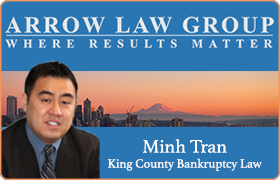Sammamish Bankruptcy Lawyer, Washington
Sponsored Law Firm
-
 x
x

Click For More Info:
-
Arrow Law Group, PLLC
1904 3rd Ave., Ste 930, Seattle, WA 98101 » view mapKing County Bankruptcy Lawyer Where Results Matter
Arrow Law Group works together to devote their practice to helping people resolve issues related to debts, personal injury, family law, criminal defense, and immigration.
800-821-3170  Minh T. Tran Seattle, WA
Minh T. Tran Seattle, WAAttorney At Law - WA, 2009
Michigan State, J.D.
 Contact UsEmail or Call 24/7
Contact UsEmail or Call 24/7Contact Arrow Law Group, PLLC today
Includes: Bankruptcy Litigation, Commercial Bankruptcy, Consumer Bankruptcy, Dissolution
David Westgor
Intellectual Property, Corporate, Contract, Commercial Bankruptcy
Status: In Good Standing Licensed: 31 Years
Roy Elbert Huhs
Land Use & Zoning, Intellectual Property, Corporate, Commercial Bankruptcy
Status: Inactive Licensed: 51 Years
Steven Mcentire Glasgow
Corporate, Consumer Bankruptcy, Intellectual Property, Contract
Status: In Good Standing Licensed: 20 Years
Stephen Gregory Smith
Employment Discrimination, Insurance, Bankruptcy, Personal Injury
Status: In Good Standing Licensed: 44 Years
Michael S Essig
Real Estate, DUI-DWI, Business, Bankruptcy
Status: In Good Standing Licensed: 24 Years
Kimberly Anne Meyer
Intellectual Property, Corporate, Contract, Commercial Bankruptcy
Status: In Good Standing Licensed: 28 Years
Shona Catriona Smith
International Other, Securities, Corporate, Commercial Bankruptcy
Status: In Good Standing Licensed: 21 Years
Andrea Dee Hardin
Estate Planning, Elder Law, Corporate, Bankruptcy
Status: In Good Standing Licensed: 25 Years


 Minh T. Tran Seattle, WA
Minh T. Tran Seattle, WA Contact UsEmail or Call 24/7
Contact UsEmail or Call 24/7
